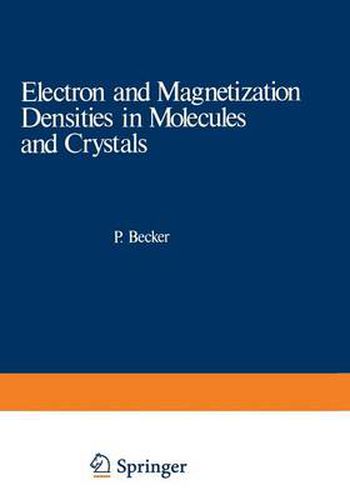Readings Newsletter
Become a Readings Member to make your shopping experience even easier.
Sign in or sign up for free!
You’re not far away from qualifying for FREE standard shipping within Australia
You’ve qualified for FREE standard shipping within Australia
The cart is loading…






This title is printed to order. This book may have been self-published. If so, we cannot guarantee the quality of the content. In the main most books will have gone through the editing process however some may not. We therefore suggest that you be aware of this before ordering this book. If in doubt check either the author or publisher’s details as we are unable to accept any returns unless they are faulty. Please contact us if you have any questions.
The interest of describing the ground state properties of a system in terms of one electron density (or its two spin components) is obvious, in particular due to the simple physical significance of this function. Recent experimental progress in diffraction made the measurement of charge and magnetization densities in crystalline solids possible, with an accuracy at least as good as theoretical accuracy. Theoretical developments of the many-body problem have proved the extreme importance of the one electron density function and presently, accurate methods of band structure determination become available. Parallel to the diffraction techniques, other domains of research (inelastic scattering, resonance, molecular spectroscopy) deal with quantities directly related to the one particle density. But the two types of studies do not interfere enough and one should obviously gain more information by interpreting all experiments that are related to the density together. It became necessary to have an International School that reviews the status of the art in the domain of ELECTRON AND MAGNETIZATION DENSITIES IN MOLECULES AND CRYSTALS . This was made possible through the generous effort of N.A.T.O. ‘s Scientific Affairs Division, and I would specially thank Dr. T. KESTER, the head of this Division, for his help and competence. An Advanced Study Institute was thus held in ARLES, south France, from the 16th to the 31st of August 1978.
$9.00 standard shipping within Australia
FREE standard shipping within Australia for orders over $100.00
Express & International shipping calculated at checkout
This title is printed to order. This book may have been self-published. If so, we cannot guarantee the quality of the content. In the main most books will have gone through the editing process however some may not. We therefore suggest that you be aware of this before ordering this book. If in doubt check either the author or publisher’s details as we are unable to accept any returns unless they are faulty. Please contact us if you have any questions.
The interest of describing the ground state properties of a system in terms of one electron density (or its two spin components) is obvious, in particular due to the simple physical significance of this function. Recent experimental progress in diffraction made the measurement of charge and magnetization densities in crystalline solids possible, with an accuracy at least as good as theoretical accuracy. Theoretical developments of the many-body problem have proved the extreme importance of the one electron density function and presently, accurate methods of band structure determination become available. Parallel to the diffraction techniques, other domains of research (inelastic scattering, resonance, molecular spectroscopy) deal with quantities directly related to the one particle density. But the two types of studies do not interfere enough and one should obviously gain more information by interpreting all experiments that are related to the density together. It became necessary to have an International School that reviews the status of the art in the domain of ELECTRON AND MAGNETIZATION DENSITIES IN MOLECULES AND CRYSTALS . This was made possible through the generous effort of N.A.T.O. ‘s Scientific Affairs Division, and I would specially thank Dr. T. KESTER, the head of this Division, for his help and competence. An Advanced Study Institute was thus held in ARLES, south France, from the 16th to the 31st of August 1978.